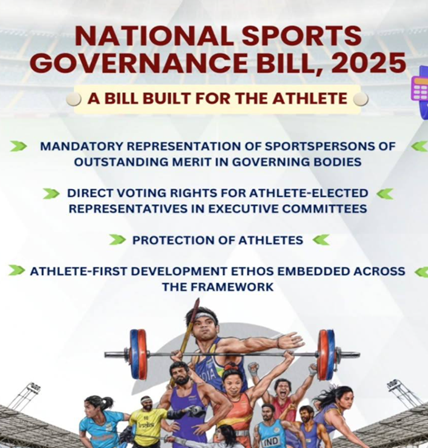PREVIOUS
National Sports Governance Bill 2025
July 26 , 2025
210 days
588
0
- The Sports Minister, Mansukh Mandaviya, has introduced the National Sports Governance Bill in the Lok Sabha.
- It aims to improve transparency and accountability in sports administration.
- It targets the national sports bodies including the Board of Control for Cricket in India (BCCI).
- It aims to establish a robust regulatory framework to govern sports federations and promote athlete welfare.
- It has provisions for a National Sports Board (NSB) to create a stringent system of accountability.
- All National Sports Federations (NSFs) will have to attain NSB’s recognition for access to central government funding.
- The NSB will comprise a chairperson.
- And its members will also be appointed by the central government from “amongst persons of ability, integrity and standing.”
- The Board’s constituents will also be expected to possess “special knowledge or practical experience in the field of public administration, sports governance, sports law and other related fields.”
- The appointments would be done based on the recommendations of a search-cum-selection committee.
- The selection committee would be made up of the Cabinet Secretary or the Secretary of Sports as chairperson.
- It also comprises an eminent sportsperson.
- The eminent sportsperson will be a Dronacharya, Khel Ratna or Arjuna awardee.
- The NSB will have the mandate to de-recognise a national body that fails to hold elections for its Executive Committee or has committed “gross irregularities in the election procedures.”
- Failure to publish annual audited accounts or “misappropriated of public funds” would also be liable for action.
- Another striking feature is the proposal for a National Sports Tribunal.
- It will have the powers of a civil court and decide disputes ranging from selection to election involving federations and athletes.
- Once instituted, the Tribunal’s decisions can only be challenged in the Supreme Court.
- The bill makes some concessions on the issue of the age cap for administrators.
- It will allow those in the bracket of 70 to 75 to contest elections if the concerned international bodies’ statutes and byelaws allow for it.
- It is a departure from the national sports code that capped the age limit at 70.
- All recognised national sports bodies would also come under the ambit of the Right to Information (RTI) Act.
- The BCCI has vehemently opposed, since it is not dependent on the government funding.
- The ministry has insisted that the BCCI, which is now a very part of the Olympic movement following cricket’s inclusion in the 2028 Los Angeles Olympics Games roster, will have to comply with the provisions of the bill once it becomes an act.
- The bill also provides for a National Sports Election Panel consisting of the former members of the Election Commission of India or the State Election Commission or the former Chief Electoral Officers of the States or the Deputy Election Commissioners.

Leave a Reply
Your Comment is awaiting moderation.


